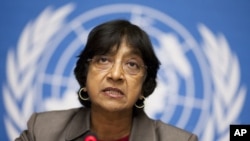The U.N.’s top diplomat in Libya, Ian Martin, confirmed publicly Wednesday that recent fighting in the town of Bani Walid was due to a local dispute and not supporters of former Libyan ruler Moammar Gadhafi trying to reassert control over the city.
In his monthly update to the U.N. Security Council, Martin said the challenge of reconciliation can be highlighted by the outbreak of fighting in the northern town of Bani Walid.
Formerly a stronghold of loyalists to the former Gadhafi government, the town has been the scene of recent clashes. Some media reports say forces loyal to the interim government had been driven from town by pro-Gadhafi forces. Martin called that incorrect.
“Regrettably, in the charged local atmosphere, a security-related incident triggered clashes between members of the local population and the revolutionary brigades stationed in the city, as a result of which several [people] were reportedly killed," said Martin. "This has been misreported as pro-Gadhafi forces taking back control of the city.”
Martin said the Libyan authorities responded by sending units from the national army, and that it is engaging with all parties to contain the situation and address the underlying security and political challenges in the town.
Also present at Wednesday’s Security Council meeting was U.N. High Commissioner for Human Rights Navi Pillay. She addressed outstanding questions regarding possible civilian deaths resulting from NATO operations during the mission to protect Libyan civilians from attacks by the Gadhafi government before it fell. Russia has been an outspoken critic of the NATO mission and among the loudest voices calling for an investigation into civilian casualties.
Pillay said the Human Rights Council’s Commission of Inquiry is investigating the allegations.
"Information so far indicates that NATO made efforts to keep civilian casualties at a minimum," she said. "But where civilians have been killed and injured, the Alliance should disclose information about all such events and about remedial actions undertaken."
Libya’s ambassador, Abdurrahman Shalgham, told the council that he knew of only four NATO bombing incidents where there were possible civilian casualties. In one of the incidents, he said, the Libyan commander had rushed in too soon with his men, putting them at risk.
Shalgham also accused the former dictator’s fighters of hiding out in schools and hospitals, making them NATO targets. He held up a computer memory stick, saying it contained 80,000 telephone conversations between Moammar Gadhafi and the head of a hospital and others, in which the former dictator ordered the bodies of his opponents taken to sites where NATO had bombed, so it would appear as though they had been killed by NATO airstrikes.
Shalgham said the victims’ families would not allow it.
Ambassador Shalgham said Libya has let in several international organizations to investigate the matter and they have concluded that those who died, including civilians, were not killed by NATO.
"Libya is prepared to cooperate with any international investigating body under the auspices of the United Nations," he said via interpreter. "We are going to set up a mechanism to compensate victims psychologically and financially, once we have the results of the investigation."
The Libyan envoy said that without NATO’s assistance “hundreds of thousands” of people would have died in Benghazi alone.
Last year the U.N. Security Council authorized NATO to impose a no-fly zone and conduct targeted airstrikes over Libya from March to October, part of a move to protect citizens in danger of Gadhafi forces who were trying to put down a rebellion against his 42-year rule.
Diplomat: New Libyan Clashes Due to Local Dispute











